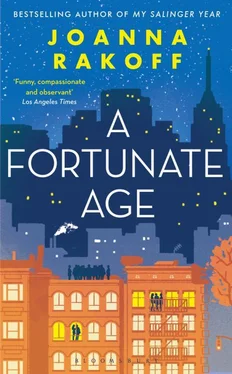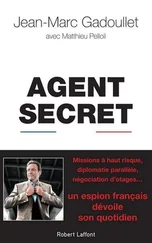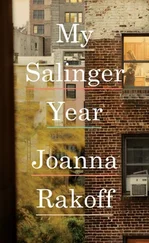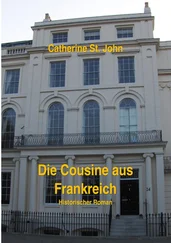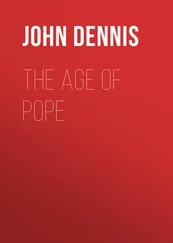“Tell your parents that Peter Carson thinks you can get into Yale,” Sadie had encouraged him (had she loved Tal even then? Did she really love Tal now? He’d always half thought he’d been the one she wanted, not that he’d ever admit that to anyone). “My parents,” Tal told her, “don’t care about Peter Carson or what he thinks.” They were so reluctant to encourage his acting that his senior year at Concord they’d refused to attend any and every play in which he was cast—from Midsummer to Six Characters in Search of an Author to the play that Tal himself wrote —which would have been enough to make Dave fucking burn their house down, but not Tal, he loved them, the Morgenthals—“They’re great, really”—and he couldn’t stand the thought of disappointing them, even in the smallest way, which just made no sense to Dave. Poor Tal , Dave had thought, again and again in college, watching his friend take these deadly poli-sci classes to pacify his hard-ass father, who was under the impression that his only son, his only child , would be Harvard Law, class of ’97, not that Tal did anything to disabuse him of this notion.
“He’s wearing himself out,” Dave told Sadie early in their senior year. “It’s moronic. He rehearses until, like, midnight, then he hangs out with me and when I go to bed, he, like, studies .”
“Dave, there’s a difference between wearing yourself out and working ,” retorted Sadie. “We all can’t live Dave Kohane’s life of leisure.”
But Sadie, for once, didn’t get it: that Tal might give it all up, give everything up, might become this waste of a life , this suburban nothing, that he might become one of those people who do the “right” thing, the expected thing, that he might go to fucking law school and get married and live in fucking Newton and listen to public radio in his Volvo and Dave would be left alone, alone with himself.
As it turned out, Dave was the waste, the one who disappointed everyone. Nine months after commencement, there was Tal, hawking Clearasil between segments of 90210 (which Dave watched ironically—or so he told himself). There was a Snickers ad, a play at the Atlantic, then a little spot in a skit on Conan , then regular spots in skits on Conan , then—almost simultaneously—the secondary role in a truly awful Robin Williams movie, a tertiary role in a short-lived sitcom, and the sale of a screenplay, to the producers behind There’s Something About Mary , which Tal had decided was “subversive” rather than stupid (Tal, who, in college, had watched La Dolce Vita so many times he’d worn out the tape), and now this bigger movie, this movie that seemed like it wasn’t actually going to suck . Suddenly, he was out of town half the time and when he wasn’t, he was with Sadie, or he was working on screenplays with his writing partner, some cocky comedy guy who could never remember Dave’s name, and beyond that he always had things to do, people to see, and he never invited Dave along with him, almost as if he was afraid Dave was going to hit up his shiny, successful friends for—what?—a part in their next asshole movie? Money?
He wasn’t famous, Tal, not even close, but that could change at any second. A few months ago, the alumni magazine had run a little story about Tal and two other alums working in film, an older, famous screenwriter and an even older director of art-house features. Tal, at twenty-six, was the youngest. He was twenty-seven now, as Dave would be in November, which made them four years older than Curtis Lang, the frontman for Dave’s band, a scruffy-haired kid with a long, serious face, class of ’98, who wrote strange, meandering tunes with even stranger lyrics, studded, though, with moments of freaky insight, which Dave wished he’d come up with himself. “How selfish of you, to believe in me,” went one.
In the mornings, as Dave lay in bed thinking, his new neighbors stomped across the floor—he hadn’t considered this problem before purchasing a garden-level flat (which was, of course, just a nice name for a fucking basement )—occasionally shouting to each other from one end of their apartment to the other. These cries permeated Dave’s ceiling, the materials of which—wood, plaster—translated the English words spoken nine feet above him into a muffled hum, like the incomprehensible mumblings of the unseen adult characters in Peanuts cartoons. The female part of the couple was strange and sexy, with a broad, mannish face and wide-set hazel eyes. He saw her sometimes at the Met Foods, buying limp stalks of broccoli and flower-imprinted luncheon napkins or large quantities of limes for the parties this couple regularly held, loud affairs to which he was usually invited and occasionally attended, returning to his own apartment after a dull conversation with an aspiring journalist or web designer, only to hear the noise of the gathering—hoots and crashes and stomps and laughs—in his own apartment, nearly as loud as it had been moments before, when he’d wandered the center of it, wineglass in hand.
The building was made of limestone and sounds echoed strangely, select tones amplified. Sometimes, Dave thought of recording them and using them for something. More often, he thought of how the town house was once home to a single family, before being carved up into little apartments, the detail stripped out of them, narrow halls carved in to make way for tiny baby rooms and closets. When Dave was little, his aunt Judy—Uncle Steve’s wife and Evelyn’s mother—had died, and his father and uncle had talked endlessly of leaving their apartments—Dave’s family in Cobble Hill, though it was just called “Brooklyn” then, and Evelyn’s in Brooklyn Heights—buying such a house, and restoring it to its former grandeur, for their two small families to share, the unstoppable Kohane brothers, no longer separated by the twenty-odd blocks between Joralemon Street and Baltic. They’d grown up in such a house, a few miles east in Midwood, chasing each other up and down the stairs (and profited nicely from its sale after their mother’s death). As kids, Dave and Evelyn paid weekly visits to this ancestral home. They, too, chased each other up and down the carpeted stairs, but with much less vigor than their fathers, both of them quiet children, always collapsing onto the nearest sofa with a book and a cookie, dark circles ringing their almond-shaped Kohane eyes. Dave, even skinnier then, could never quite work himself into the frenzy of teasing that came so naturally to the other little boys. He would try, pouncing on Evelyn as she sat reading, and pulling her hair or tickling her until she screamed “Stop, stop, stop, I hate you” in a hoarse voice and ran up the stairs to lock herself in her father’s old room, where she kept a cache of worn stuffed animals and dog-eared mystery novels. Dave would trail her, reach out a long, bony hand to grab her sneakered foot, and drag her down the stairs, booming “You must come vith me,” like his father imitating Bela Lugosi, but his heart wasn’t in it, and eventually he’d let her go.
Adolescence morphed him into one of those wan kids you see near Lincoln Center on Saturdays, heading off to Juilliard with a black nylon bag full of music, his skin cast green from the fluorescent light of the practice room. He did a double degree at Oberlin, piano performance and philosophy, which he finished in just four years, though—he frequently reminded his parents—most double degree students took five. And he had headed off to Eastman after graduation, full of hope and excitement. Or that’s what he’d thought at the time. Now he saw that maybe this wasn’t the case. Maybe he’d headed off to Eastman already defeated and full of fear. That if he’d really wanted that life—the solo career, the record deal, whatever—he wouldn’t have gone to Eastman at all, but would have entered the big contests, sought out the agent, done the things you do to become a sort of star. The whole point of going to Eastman was to wind up with a job at some sad, loser college.
Читать дальше
